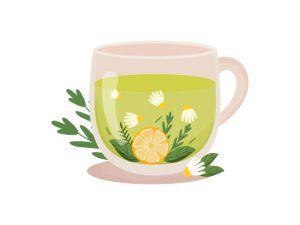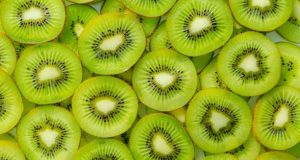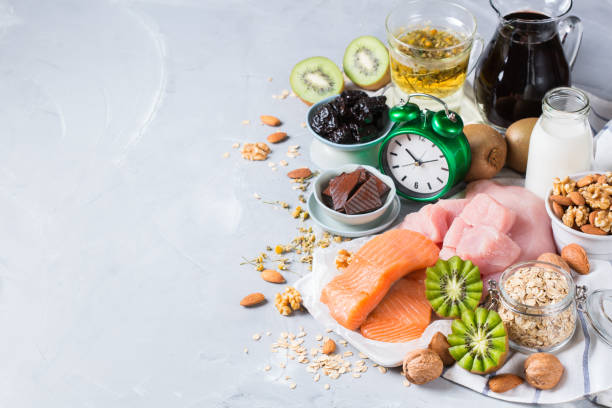Table of Contents
ToggleSleep is essential for a healthy body and mind, yet many people struggle to get the quality rest they need. Factors such as stress, anxiety, and poor diet can all contribute to sleep disturbances. Fortunately, there are natural ways to promote better sleep, including incorporating certain foods into your diet. In this ultimate guide, we will explore the 7 best foods to eat before bed to help you achieve a good night’s sleep.
Benefits of Bananas for Sleep

Bananas are an excellent natural remedy for improving sleep quality. They contain tryptophan, an amino acid that the body converts into serotonin, a neurotransmitter that regulates sleep. Bananas are rich in magnesium, a mineral that helps relax muscles and promote calmness, which can also contribute to better sleep. Incorporating bananas into your diet may be a simple and effective way to improve your sleep quality.
Nutritional Value of Bananas
Bananas are not only delicious but also nutritious. They are a good source of energy, with one medium-sized banana containing about 105 calories, 27 grams of carbohydrates, 3 grams of fiber, and 1 gram of protein. Bananas also provide essential vitamins and minerals, such as vitamin C, vitamin B6, potassium, and manganese. Vitamin C is a potent antioxidant that helps protect cells from free radical damage, while vitamin B6 supports brain function and the nervous system. Potassium is a critical mineral for regulating blood pressure, and manganese contributes to bone health and wound healing.
Creative Ways to Incorporate Bananas into Your Diet
Bananas offer versatility as a fruit, allowing enjoyment through various methods beyond the simple act of snacking on them. One creative way to incorporate bananas into your diet is by using them as a natural sweetener in smoothies or baked goods like banana bread. Adding bananas to your morning oatmeal or pancakes can provide a natural sweetness and a nutritional boost. For a healthy dessert option, try freezing sliced bananas and blending them into a creamy and delicious banana ice cream. By experimenting with different recipes and using bananas in new ways, you can enjoy their nutritional benefits while also satisfying your taste buds.
Why Warm Milk is Good for Sleep

Warm milk has been a popular bedtime beverage for centuries and for good reason. It is often touted as a natural sleep aid due to its relaxing properties. The warmth of the milk helps to soothe the body and calm the mind, making it easier to fall asleep and stay asleep throughout the night.
Nutritional Information about Milk
Milk is also a rich source of calcium, which is essential for strong bones and teeth. Calcium also plays a role in muscle and nerve function, making it an important nutrient for overall health and wellness. Milk is also a good source of protein, which helps to keep you feeling full and satisfied throughout the night. Milk is fortified with vitamin D, which helps the body absorb calcium and is important for maintaining healthy bones and immune function.
Tips for Making the Perfect Cup of Warm Milk
To make the perfect cup of warm milk, start with a clean, microwave-safe mug. Pour in the desired amount of milk and heat it in the microwave for 1-2 minutes, or until it reaches the desired temperature. Be careful not to overheat the milk, as this can cause it to scorch and create an unpleasant taste. If you prefer a frothy texture, use a milk frother or whisk to create foam on top of the milk. Add a pinch of cinnamon or nutmeg for added flavor and relaxation.
Important Considerations
Note that warm milk should not be relied upon as a cure for insomnia or other sleep disorders. Instead, incorporate it as part of a relaxing bedtime routine, which can also involve activities such as reading a book, taking a warm bath, or practicing relaxation techniques like deep breathing or meditation. If you continue to experience difficulty sleeping, consider speaking with a healthcare professional who can offer guidance and support.
The Health Benefits of Almonds

Almonds are a great source of various nutrients, making them an excellent addition to any diet. They are high in magnesium, a mineral that aids in better sleep and has a calming effect on the brain. They contain plant-based protein, healthy fats, and fiber, making them a perfect snack to enjoy throughout the day. Almonds are also high in vitamin E, calcium, potassium, and iron, essential minerals for maintaining strong bones and overall good health.
Incorporating Almonds into Your Diet
There are many ways to incorporate almonds into one’s diet. They can be enjoyed raw as a healthy snack, added to salads or yogurt for an extra crunch, or used as an alternative to peanut butter in recipes. Almond milk is also a great dairy-free alternative that can be used in baking or enjoyed on its own. For those who enjoy cooking, almond-crusted chicken is a simple and delicious recipe that adds healthy fats and protein to any meal.
Recipe Ideas for Almonds
Almond-crusted chicken is an easy recipe that can be enjoyed by everyone. Simply coat chicken breasts in almond meal, salt, and pepper, and bake in the oven until cooked through. Almond butter is also a great alternative to peanut butter and can be used in smoothies, oatmeal, or even spread on toast. Almond milk can be used in baking or enjoyed on its own as a refreshing drink.
Chamomile Tea: A Soothing and Relaxing Beverage

Chamomile tea is a popular herbal beverage that is widely known for its calming and relaxing properties. It is an excellent choice for those who struggle with sleep issues or who want to unwind after a long day.
Why Chamomile Tea is Good for Sleep
Chamomile tea contains an antioxidant called apigenin, which is known to have a mild sedative effect on the body. This makes it an ideal natural remedy for insomnia, anxiety, and other sleep-related problems.
The Science Behind Chamomile Tea’s Sleep-Inducing Properties
The science behind chamomile tea’s sleep-inducing properties lies in its ability to bind to specific receptors in the brain. Apigenin interacts with benzodiazepine receptors, which are located in the central nervous system. By binding to these receptors, apigenin can promote relaxation and reduce anxiety levels, thereby improving sleep quality.
How to Prepare and Enjoy a Cup of Chamomile Tea
To prepare a delicious cup of chamomile tea, start by boiling water in a kettle. Once the water has boiled, pour it into a teapot or a cup containing a chamomile tea bag. Let it steep for 3-5 minutes, depending on the desired strength of the tea. For added flavor, you can add a teaspoon of honey or a slice of lemon to your tea. Chamomile tea is best enjoyed before bedtime, as it can help soothe the mind and body, preparing you for a restful sleep. It can also be enjoyed during the day to help calm nerves and promote relaxation.
Benefits of Oatmeal for Sleep

Oatmeal is a nutritious and versatile food that can benefit your overall health, particularly your sleep quality. One of the reasons why oatmeal is good for sleep is because it contains high levels of tryptophan, an amino acid that is converted into serotonin in the brain.
Serotonin is a neurotransmitter that promotes feelings of relaxation and calmness, which can help you fall asleep faster and sleep more soundly throughout the night. Oatmeal is a great source of complex carbohydrates that release glucose slowly into the bloodstream, providing a sustained source of energy and helping to regulate blood sugar levels. This steady release of energy can prevent spikes and crashes in blood sugar that may interfere with sleep.
Nutritional Information about Oatmeal
In terms of nutritional value, oatmeal is packed with essential vitamins and minerals that are vital for maintaining good health. For example, one cup of cooked oatmeal contains 166 calories, 6 grams of protein, 4 grams of fiber, and significant amounts of iron, magnesium, zinc, and B vitamins. Oatmeal is also low in fat and cholesterol-free, making it an ideal food for weight management and heart health.
Recipe Ideas for Incorporating Oatmeal into Your Diet
If you’re looking to incorporate oatmeal into your diet, there are numerous recipe ideas to choose from. One classic option is to make a warm bowl of oatmeal topped with fresh fruit, nuts, and honey or maple syrup. You can also try making overnight oats by mixing oats with milk or yogurt, chia seeds, and your favorite sweeteners or toppings and leaving the mixture in the refrigerator overnight.
Another creative way to use oatmeal is by adding it to smoothies or baked goods like muffins or cookies. The possibilities are endless when it comes to incorporating oatmeal into your diet, making it an easy and delicious way to boost your nutrient intake and promote better sleep.
The Health Benefits of Turkey

Turkey is a popular bird that is consumed worldwide for its delicious meat and various health benefits. One of the primary reasons why turkey is a great food for sleep is because it contains the amino acid tryptophan, which helps promote sleep and improves the quality of rest. Turkey is a lean protein source that helps build and repair muscle tissue, making it an ideal choice for those looking to improve their overall physical health.
Nutritional Information About Turkey
Turkey is a fantastic source of several essential vitamins and minerals, making it a healthy addition to any diet. It is low in fat and calories, making it a perfect food for those trying to maintain a healthy weight. Turkey is also rich in B vitamins such as B6 and niacin, which help support the nervous system, enhance brain function, and promote healthy skin, eyes, and hair. Turkey is an excellent source of selenium, which is vital for immune function, thyroid health, and DNA synthesis.
Creative Ways to Incorporate Turkey into Your Diet
Incorporating turkey into your diet can be a delicious and healthy way to improve your overall well-being. Ground turkey can be used to make burgers, meatballs, or chili, while turkey breast can be sliced and used in sandwiches or wraps. Another creative way to incorporate turkey into your diet is by adding it to salads, soups, or stir-fry dishes. Finally, turkey can be enjoyed as a standalone dish, roasted with herbs and spices for a flavorful and healthy meal. With so many versatile options, there are plenty of ways to incorporate turkey into your diet and reap the benefits of its various nutrients.
The Health Benefits of Kiwi
Move over counting sheep, there’s a new sleep-inducing superstar in town and it’s none other than the quirky kiwi fruit! This pint-sized powerhouse has gained popularity due to its impressive ability to improve sleep. How, you may ask? Well, kiwis contain high levels of serotonin, a neurotransmitter that plays a crucial role in regulating sleep patterns. Serotonin induces feelings of relaxation and calmness, making it easier for individuals to fall asleep faster and stay asleep for longer periods.
Why Kiwi is Good for Sleep

Did you know that Kiwis are sleep superheroes?
These little green fruits pack serotonin, a neurotransmitter that plays a crucial role in regulating sleep patterns.
So, if you’re having trouble catching some Zs, skip the sleeping pills and grab a Kiwi instead!
Nutritional Information about Kiwi
Apart from promoting better sleep, kiwis are also packed with essential vitamins and minerals that are beneficial to the body. A single kiwi fruit contains more than 100% of the recommended daily intake of vitamin C, which is essential in boosting the immune system and preventing chronic diseases. Kiwis also contain high levels of vitamin K, which is crucial in promoting bone health and blood clotting. In addition to vitamins, kiwis are also rich in antioxidants and fiber.
Recipe Ideas for Incorporating Kiwi into Your Diet
There are numerous ways to incorporate kiwi into your diet, from eating it as a snack to using it as an ingredient in meals. One simple recipe idea is to make a kiwi smoothie by blending kiwi fruit, banana, spinach, and almond milk. Another recipe idea is to use kiwi as a topping for your favorite breakfast cereal or oatmeal. Kiwis can also be used in salads, as a topping for yogurt, or as a garnish for cocktails.










